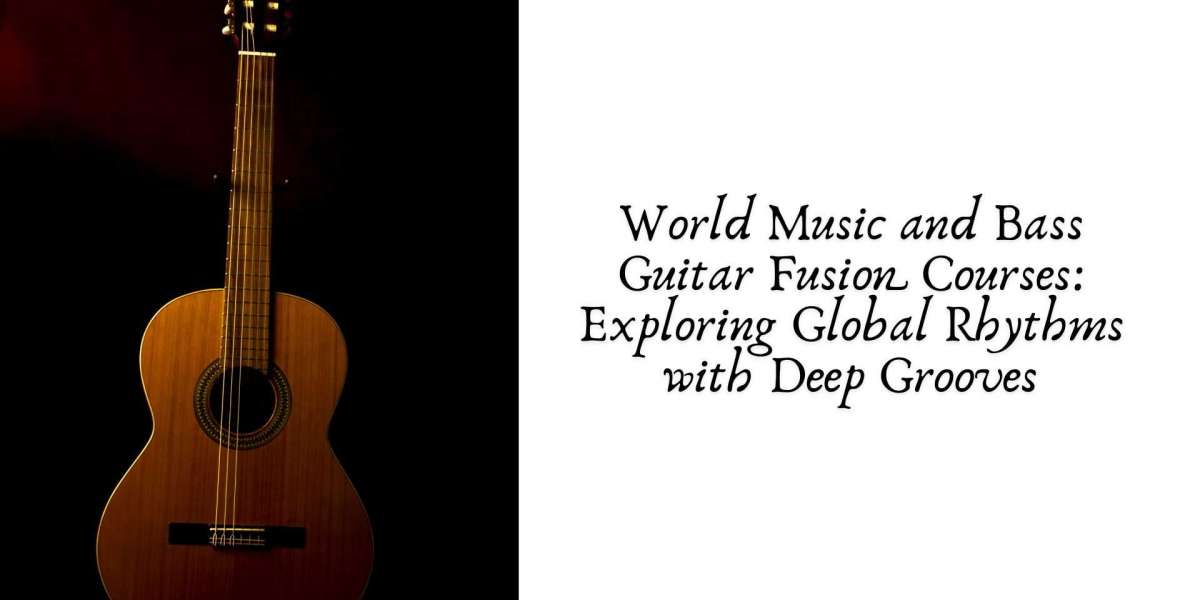Introduction
In the ever-evolving world of music education, one exciting and enriching avenue is the fusion of world music with bass guitar. “World Music and Bass Guitar Fusion Courses” offer musicians an opportunity to bridge cultural gaps, deepen rhythmic understanding, and expand their creative voice. Whether you're a seasoned bassist or a curious beginner, these courses provide a unique exploration of how global rhythms and melodies intersect with the foundational grooves of the bass guitar.
What is World Music?
World music encompasses traditional, folk, and indigenous music from cultures around the globe. It includes African tribal beats, Indian ragas, Latin rhythms, Middle Eastern maqams, East Asian pentatonics, and more. These styles often use non-Western scales, complex time signatures, and traditional instruments that differ from standard Western music norms.
By blending this rich tapestry with bass guitar—a central instrument in genres like jazz, funk, and rock—musicians can create fusion styles that are both innovative and culturally significant.
Why Combine World Music with Bass Guitar?
Bass guitar acts as a bridge between rhythm and harmony. It’s the backbone of many musical styles, and when combined with world music, it helps anchor unfamiliar sounds into accessible grooves. Here’s why this combination is powerful:
- Rhythmic Complexity: Many world music styles involve intricate time signatures and polyrhythms. Bass helps provide structure and continuity.
- Cultural Fusion: Students get hands-on exposure to diverse musical traditions, broadening their global awareness and musical versatility.
- Creative Expression: Fusion encourages experimentation, allowing musicians to develop a unique sound.
- Professional Edge: In an industry valuing diversity and innovation, fusion skills can open doors in world music ensembles, film scoring, and cross-cultural collaborations.
What You’ll Learn in World Music and Bass Guitar Fusion Courses
These specialized courses cover a variety of topics that integrate technical skills, cultural context, and creative composition. Typical course modules include:
Foundations of World Rhythms
- Overview of rhythm patterns from Africa, Latin America, India, and the Middle East.
- Understanding traditional percussion instruments and how their rhythms can be translated to bass.
Ethnomusicology Basics
- A study of cultural music traditions and their historical significance.
- Exploration of folk scales, modes, and tuning systems across cultures.
Bass Techniques for Fusion
- Slap and pop techniques influenced by African funk.
- Walking bass lines with Indian rhythmic cycles (Talas).
- Use of alternate tunings and fretless bass to mimic traditional sounds.
Improvisation Across Cultures
- Modal improvisation based on Arabic maqams or Indian ragas.
- Learning to improvise within unfamiliar time signatures like 7/8 or 5/4.
Collaborative Composition
- Working with musicians who play traditional world instruments.
- Composing original fusion pieces blending electric bass with cultural elements.
Performance and Recording
- Live performance workshops with percussionists, vocalists, and instrumentalists from various traditions.
- Basics of recording world music fusion in studio settings, using DAWs and plugins that simulate ethnic instruments.
Who Should Take These Courses?
- Bass Guitarists looking to expand beyond rock, pop, or jazz.
- Composers and Producers who want to incorporate global elements into their music.
- Music Teachers seeking to diversify their teaching repertoire.
- World Music Enthusiasts interested in hands-on learning.
Popular Institutions and Online Platforms
Several institutions and platforms offer world music and bass fusion programs, including:
- Berklee College of Music – Offers electives in world music ensembles and global rhythm studies.
- Coursera and Udemy – Feature fusion bass guitar courses with global music integration.
- ArtistWorks – Provides lessons from renowned fusion bassists.
- Local Music Schools – Some conservatories and cultural centers offer workshops in Indian classical music, Afro-Cuban rhythms, or Balkan grooves for bass players.
Notable Artists in World Music Bass Fusion
Many bassists have pioneered this genre and serve as inspiration for aspiring students:
- Richard Bona – Cameroonian bassist blending jazz with African traditional music.
- Victor Wooten – Known for integrating global rhythms into his funk and solo bass playing.
- Tal Wilkenfeld – Combines Western rock with various world music influences.
- Michael Manring – Uses alternate tunings and ambient textures reminiscent of Eastern music.
Benefits of Learning Bass in a Global Context
- Expanded Musical Vocabulary – Exposure to new scales, rhythms, and phrasing.
- Cultural Sensitivity – Better understanding and appreciation of music traditions worldwide.
- Unique Career Opportunities – World music festivals, fusion bands, and international collaborations.
Final Thoughts
World Music and Bass Guitar Fusion Courses are more than just music classes—they are cultural journeys. They challenge musicians to step outside conventional boundaries and develop a sound that is both deeply personal and globally aware. In a world where music increasingly transcends borders, such courses equip bassists with the tools to not just play, but to connect, express, and innovate.
Whether your goal is to groove with Indian tabla players, jam with African drummers, or score soundtracks inspired by global landscapes, fusion courses are the key to unlocking your potential as a world-conscious musician. So plug in, listen deeply, and let the global groove guide your fingers.








